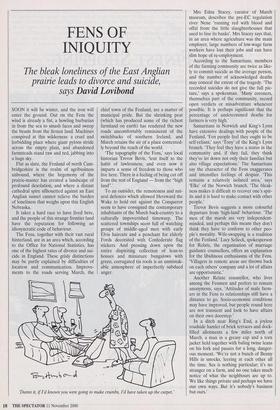FENS OF INIQUITY
The bleak loneliness of the East Anglian prairie leads to divorce and suicide,
says David Lavibond SOON it will be winter, and the iron will enter the ground. Out on the Fens the wind is already a fist, a howling barbarian in from the sea to smash faces and sweep the beasts from the frozen land. Machines conspired at this wilderness: a cruel and forbidding place where giant pylons stride across the empty plain, and abandoned farmsteads stand raw and red, jabbing into a huge sky.
Flat as slate, the Fenland of north Cam- bridgeshire is the realm of agribusiness unbound, where the hegemony of the prairie-master has created a landscape of profound desolation, and where a distant cathedral spire silhouetted against an East Anglian sunset cannot relieve the burden of loneliness that weighs upon this English Nebraska.
It takes a hard race to have lived here, and the people of this strange frontier land have the reputation for following an idiosyncratic code of behaviour.
The Fens, together with their vast rural hinterland, are in an area which, according to the Office for National Statistics, has one of the highest rates of divorce and sui- cide in England. These grisly distinctions may be partly explained by difficulties of location and communication. Improve- ments to the roads serving March, the chief town of the Fenland, are a matter of municipal pride. But the shrinking peat (which has produced some of the richest farmland on earth) has rendered the new roads uncomfortably reminiscent of the switchbacks of southern Ireland, and March retains the air of a place contented- ly beyond the reach of the world.
`The topography of the Fens,' says local historian Trevor Bevis, 'lent itself to the habit of lawlessness, and even now it imparts a sense of freedom to those who live here. There is a feeling of being cut off from the rest of England — from the "high land".'
To an outsider, the remoteness and nat- ural defences which allowed Hereward the Wake to hold out against the Conqueror seem to have consigned the contemporary inhabitants of the March back-country to a culturally impoverished timewarp. The scattered townships seem full of watching groups of middle-aged men with early Elvis haircuts and a penchant for elderly Fords decorated with Confederate flag stickers. And pressing down upon the entire dispiriting collection of lean-to houses and miniature bungalows with green, corrugated tin roofs is an unmistak- able atmosphere of imperfectly subdued anger.
Damn U, if I'd known you were going to make crumbs, I'd have taken up the carpet.' Mrs Edna Stacey, curator of March museum, describes the pre-EC regulation river Nene 'running red with blood and offal from the little slaughterhouses that used to line its banks'. Mrs Stacey says that, in an area where agriculture was the main employer, large numbers of low-wage farm workers have lost their jobs and can have slim hope of re-employment.
According to the Samaritans, members of the farming community are twice as like- ly to commit suicide as the average person, and the number of acknowledged deaths may conceal the extent of the tragedy. 'The recorded suicides do not give the full pic- ture,' says a spokesman. 'Many coroners, themselves part of the community, record open verdicts or misadventure whenever possible. It is perhaps significant that the percentage of undetermined deaths for farmers is very high.'
Samaritans in Norwich and King's Lynn have extensive dealings with people of the Fenland. 'Fen people feel they ought to be self-reliant,' says 'Tony' of the King's Lynn branch. 'They feel they have a status in the community and, if they fail, they think they've let down not only their families but also village expectations.' The Samaritans say the character of the Fens exaggerates and intensifies feelings of despair. 'This remains a relatively isolated area,' says 'Elke' of the Norwich branch. The bleak- ness makes it difficult to recover one's spir- its and it is hard to make contact with other people.'
Trevor Bevis suggests a more colourful departure from 'high-land' behaviour. The men of the marsh are very independent- minded, and perhaps this means they don't think they have to conform to other peo- ple's morality. Wife-swapping is a tradition of the Fenland.' Lucy Selleck, spokesperson for Relate, the organisation of marriage guidance counsellors, offers an explanation for the libidinous enthusiasms of the Fens. `Villagers in remote areas are thrown back on each others' company and a lot of affairs are opportunistic.'
Another Relate counsellor, who lives among the Fenmen and prefers to remain anonymous, says, 'Attitudes of male farm- ers in the Fens to relationships still have a distance to go. Socio-economic conditions may have improved, but people round here are not transient and look to have affairs on their own doorstep.'
In a ditch near Ring's End, a joyless roadside hamlet of brick terraces and dock- filled allotments a few miles north of March, a man in a greasy cap and a torn jacket held together with baling twine leans on his fork and pauses for a long, danger- ous moment. 'We're not a bunch of Benny Hills in smocks, leering at each other all the time. Sex is nothing particular; it's no stranger on a farm, and no one takes much notice of what the neighbours are up to. We like things private and perhaps we have our own ways. But it's nobody's business but ours.'


























































































 Previous page
Previous page